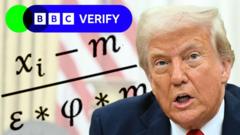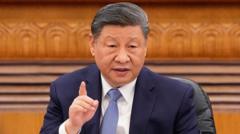In a surprising turn of events, the United Kingdom faces a 10% tariff from President Trump's administration, despite extensive outreach by Prime Minister Keir Starmer aimed at strengthening U.S.-U.K. relations. The tariff, although lower than that imposed on European Union countries, signifies a challenge for Britain as it seeks to navigate its post-Brexit trade landscape. While Starmer's team views this as fuel for potential future trade negotiations with the U.S., economic experts urge care in response strategies as Britain wrestles with the implications of the tariff on its economy.
Trump’s Tariffs Hit U.K. Despite Diplomatic Efforts

Trump’s Tariffs Hit U.K. Despite Diplomatic Efforts
Despite a royal invitation and attempts to foster goodwill, President Trump targets the U.K. with tariffs.
The international trade landscape is continually shifting, and the recent tariffs imposed by President Trump have re-ignited tensions between the U.S. and several of its trading partners, including the United Kingdom. Recently, after Prime Minister Keir Starmer extended an invitation for a royal state visit to President Trump in a bid to bolster trade relations, the U.K. was still subjected to a 10% blanket tariff.
This development came as the Prime Minister's aides noted that the impact was mitigated compared to the European Union’s 20% tariff, presenting a partial victory for the British government. They attributed this outcome partially to the U.K.’s decision to withdraw from the EU in 2016, potentially allowing for more favorable negotiations. Still, concerns linger as the blanket tariff could undermine the intended benefits of these efforts.
Starmer's administration is attempting to present a calm front as they navigate these challenges. He assured business leaders that the U.K. would not respond with immediate retaliatory tariffs while discussions are ongoing. Economic experts, such as Jonathan Portes from King’s College London, emphasize the need for measured responses, to avoid unnecessary conflicts while remaining firm on economic interests.
As the U.K. looks toward future trade agreements, it remains pivotal for the government to evaluate its strategy in responding to tariffs. Whether to counterbalance with retaliatory measures or continue on a path of negotiation without escalating tensions will be crucial moving forward. The ongoing situation showcases the complexities of globalization, individual national interests, and the delicate balance needed to maintain strong trade relationships.
This development came as the Prime Minister's aides noted that the impact was mitigated compared to the European Union’s 20% tariff, presenting a partial victory for the British government. They attributed this outcome partially to the U.K.’s decision to withdraw from the EU in 2016, potentially allowing for more favorable negotiations. Still, concerns linger as the blanket tariff could undermine the intended benefits of these efforts.
Starmer's administration is attempting to present a calm front as they navigate these challenges. He assured business leaders that the U.K. would not respond with immediate retaliatory tariffs while discussions are ongoing. Economic experts, such as Jonathan Portes from King’s College London, emphasize the need for measured responses, to avoid unnecessary conflicts while remaining firm on economic interests.
As the U.K. looks toward future trade agreements, it remains pivotal for the government to evaluate its strategy in responding to tariffs. Whether to counterbalance with retaliatory measures or continue on a path of negotiation without escalating tensions will be crucial moving forward. The ongoing situation showcases the complexities of globalization, individual national interests, and the delicate balance needed to maintain strong trade relationships.





















